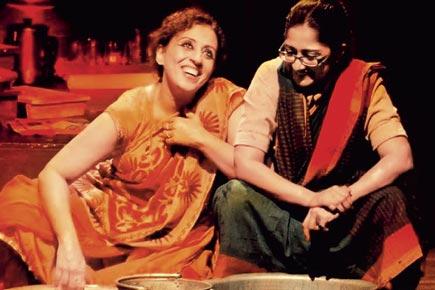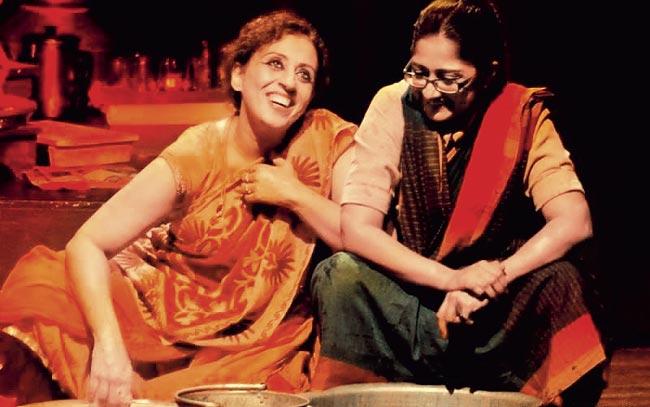Two plays travelled from outside Mumbai last fortnight, which gave a little glimpse of what theatre practitioners elsewhere are thinking and how they are including contemporary social reality in their work

 Two plays travelled from outside Mumbai last fortnight, which gave a little glimpse of what theatre practitioners elsewhere are thinking and how they are including contemporary social reality in their work.
Two plays travelled from outside Mumbai last fortnight, which gave a little glimpse of what theatre practitioners elsewhere are thinking and how they are including contemporary social reality in their work.
From Bangalore, came an important play Under the Chestnut Tree, written by Akash Mohimen and Siddharth Kumar, directed by Abhishek Saha.
ADVERTISEMENT
It’s a brave new play that tips its hat to George Orwell’s masterpiece 1984, and ties up to what is happening in the country right now, with the consistent attacks on freedom of speech reported every other day.

Ramanjit Kaur’s Baaware Mann Ke Sapne is about a girl who hated her prettier sister, a woman who hides a domestic violence situation, a young woman who reveals abuse at the hands of her grandfather, and the supposedly ‘lucky’ one who stays silent about the trauma of marital rape
The title comes from 1984’s Chestnut Tree Cafe, and the song that plays on the screens there: “Under the spreading chestnut tree I sold you and you sold me: There lie they, and here lie we....”
The phrase “Big Brother is watching” is from that iconic novel that gave fair warning about what could happen if citizens gave up their freedom under a totalitarian state, that controls every aspect of their existence, including their minds. Words like doublethink, thoughtcrime, newspeak also made an appearance in the book.
Under the Chestnut Tree is set in an unnamed, presumably european country, where the State has decreed that artists cannot use colour in their paintings and homosexuality is a punishable offence. Osman (Prashant Prakash), who was once artist laureate, has had his place usurped by his old student and rising artist eve (Shweta Tripathi).
She is quite unapologetic about the compromises she has made to reach the top and is waiting to travel to Vienna for a major art event. The third character is Captain L (Siddharth Kumar), Osman’s step-brother, who smoothly plays one against the other using bribes and threats. In the background, upsetting the establishment, is an unseen dissenter who defies the ban on colour.
With a touch of dark humour, and a marked lack of melodrama, the play talks of the perils of cultural control, homophobia and media disinformation — Siddharth Kumar, dressed like a Nazi, playing the treacherous Captain L with a mix of menace and absurdity, is as jittery as the two he manipulates into betraying each other; his position is dependent on the fickleness of the masters from whom he takes his orders.
Travelling from Kolkata was Ramanjit Kaur and her all-woman team, with Baaware Mann Ke Sapne. The performers in the production are amateurs, who formed a group called Udaan, and discovered the power of theatre. The play emerged from their own experiences with Kaur’s Theatre as therapy sessions, mingled with works of writers like Jhumpa Lahiri, Bulbul Sharma and Abha Iyenger.
Kaur writes in her director’s note, “I personally feel that the middle and upper middle class Indian women are the most underprivileged lot, in terms of not having a voice. How many times do we discuss issues that concern us? We smile silently. Silence emerging from false self-esteem, pride, fear - fear of rejection, social stigma, ridicule. Theatre is a platform that helps us get a voice, gain confidence, mould ourselves as well as our surroundings for the better, and teaches us relationship building...”
In the play, Amma (Kamal Ahluwalia) had disowned her daughter many years ago, for marrying a foreigner. Suddenly, she pines for her estranged child and wants to go to London to meet her. She summons a bunch of her female relatives to help her prepare for the journey. Sisters, cousins, aunts, nieces, daughters, gerand-daughters gather after a long span of time, under Amma’s roof. In this female space of colourful costumes, saris and dupattas on the clothesline, women are in the kitchen preparing sweets for her to carry, shopping for Amma’s first trip abroad, and reminiscing of the times gone by.
And in the midst of this female hubbub, old wounds are reopened, ancient animosities resurface and secrets are ripped out. A plain girl who hated her prettier sister; the woman who hides a domestic violence situation; the young woman who reveals abuse at the hands of her grandfather, the supposedly ‘lucky’ one who stays silent about the trauma of marital rape. The independent professional, living in Delhi, talks of an instance of sexual harassment that left her scarred with rage, her wish to remain single giving rise to moments of doubt.
It’s a sisterhood of seemingly cheerful women, engaged in mundane household chores, but also getting a chance to share their sorrows and finding a kind of solidarity in this unexpected togetherness. The lives of the characters in the play spilled out and empowered the women acting in it. At the end, when they fan out into the audience graciously distributing sweets to the audience, it is as if they are celebrating their own evolution.
Deepa Gahlot is an award-winning film and theatre critic and an arts administrator. You can follow her on twitter @deepagahlot
 Subscribe today by clicking the link and stay updated with the latest news!" Click here!
Subscribe today by clicking the link and stay updated with the latest news!" Click here!







